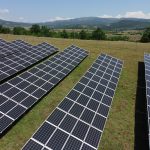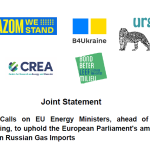On 22nd June a hybrid round-table discussion gathered participants from the business sector, academia, CSOs and government representatives from across the Western Balkans region. The event, titled „The opportunities and challenges for the business sector from the introduction of carbon pricing mechanisms in the Western Balkan Region“, took place in Skopje and online, organised jointly by Climate Action Network (CAN) Europe and the Centre for Environmental Research and Information – Ekosvest, in cooperation with the Ministry of Environment and Physical Planning of the Republic of North Macedonia.
Event participants who presented included the Macedonian and Montenegrin Ministries in charge of environmental affairs, the Macedonian Academy for Sciences and Arts, leading steel and cement industries in the Republic of North Macedonia and CAN Europe.
The Minister of Environment of the Republic of North Macedonia invited the business sector to take active part in the development of the carbon pricing pathways in the region, as the only way to secure an effective, just and successful energy transition in the Western Balkans region.
To set the scene for why Western Balkan companies need to reduce their carbon footprint urgently, CAN Europe presented Western Balkan energy and climate related policies and ambitions within the national, regional and international framework. This was followed by sharing the experience of Montenegro as the first Western Balkan country that introduced an emission trading scheme and carbon pricing mechanism, by the Ministry of Ecology, Spatial Planning and Urbanism of Montenegro.
A summary of the analysis done by the Macedonian Academy for Sciences and Arts for the purpose of development of the Carbon Tax Roadmap for North Macedonia was presented and a brief illustrative introduction of the impacts that the proposal for Regulation of the European Parliament and of the Council on establishing carbon border adjustment mechanism will have on the Western Balkans electricity market.
An open discussion followed, focusing on ways to achieve decarbonization in the region. Representatives of the civil society, the World Bank and carbon-intensive industries in the region explored key incentives and experiences for a transition towards sustainable practices.
The participants, both in person and online, shared an array of plans, experiences, challenges and opportunities for a successful and smooth energy transition in the Western Balkans. Reflecting on the discussion, it is crucial to underline the importance of prioritising energy efficiency and incentivising energy-saving investments for all sectors, in particular within the industrial processes. This approach is not only an efficient method for carbon footprint reduction, but also cost effective.
Moving away from the use of fossil fuels in the industries and transitioning towards fossil free technologies is the only way forward, as it is doable and business-smart. Well planned and timely transition towards renewable sources has proven to lower the costs across all sectors.
Thus, it is essential that regional governments set an adequate enabling framework for sufficient renewable energy and energy efficiency investments, with the allocation of the necessary funds and establishment of clear and efficient procedures for their development and deployment.
These processes must be conducted in the manner which will ensure that no one will be left behind. Just transition can play a crucial role in driving the historic momentum for a green recovery, if an effective social dialogue is established and appropriate state resources are mobilised. At the same time sustainable private investments must be encouraged.
The business sector, in partnership with government and civil society, plays a key role in the successful achievement of long term climate neutrality goals. It is of paramount importance to set credible climate and energy targets by 2030 and ensure their active and timely involvement in the related discussions. Readiness of the business sector to be part of the solution and continue the conversation was clearly expressed during the discussion and acknowledged by the representatives from the state and the civil sector.



